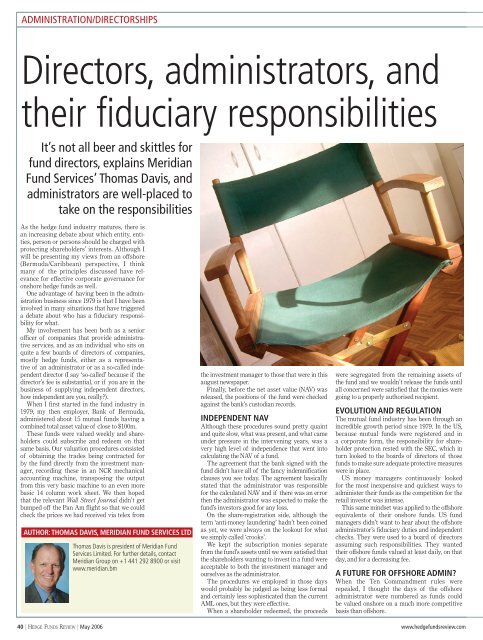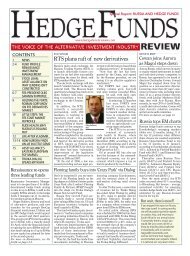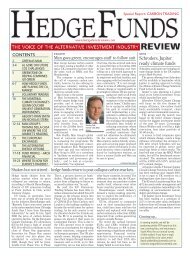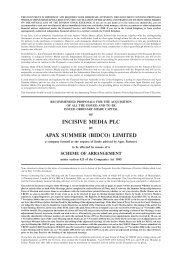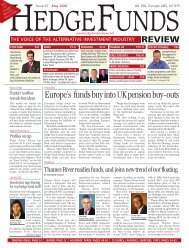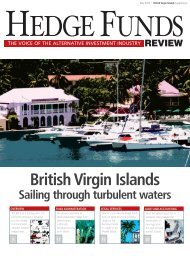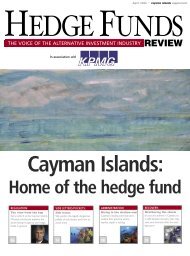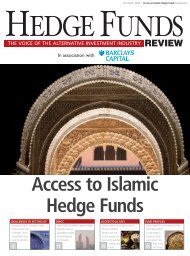ADMINISTRATION/DIRECTORSHIPSDirectors, administrators, andtheir fiduciary responsibilitiesIt’s not all beer and skittles forfund directors, explains MeridianFund Services’ Thomas Davis, andadministrators are well-placed totake on the responsibilitiesAs the hedge fund industry matures, there isan increasing debate about which entity, entities,person or persons should be charged withprotecting shareholders’ interests. Although Iwill be presenting my views from an offshore(Bermuda/Caribbean) perspective, I thinkmany of the principles discussed have relevancefor effective corporate governance foronshore hedge funds as well.One advantage of having been in the administrationbusiness since 1979 is that I have beeninvolved in many situations that have triggereda debate about who has a fiduciary responsibilityfor what.My involvement has been both as a seniorofficer of companies that provide administrativeservices, and as an individual who sits onquite a few boards of directors of companies,mostly hedge funds, either as a representativeof an administrator or as a so-called independentdirector (I say ‘so-called’ because if thedirector’s fee is substantial, or if you are in thebusiness of supplying independent directors,how independent are you, really?).When I first started in the fund industry in1979, my then employer, Bank of Bermuda,administered about 15 mutual funds having acombined total asset value of close to $100m.These funds were valued weekly and shareholderscould subscribe and redeem on thatsame basis. Our valuation procedures consistedof obtaining the trades being contracted forby the fund directly from the investment manager,recording these in an NCR mechanicalaccounting machine, transposing the outputfrom this very basic machine to an even morebasic 14 column work sheet. We then hopedthat the relevant Wall Street Journal didn’t getbumped off the Pan Am flight so that we couldcheck the prices we had received via telex fromAUTHOR: THOMAS DAVIS, MERIDIAN FUND SERVICES LTDThomas Davis is president of Meridian FundServices Limited. For further details, contactMeridian Group on +1 441 292 8900 or visitwww.meridian.bmthe investment manager to those that were in thisaugust newspaper.Finally, before the net asset value (NAV) wasreleased, the positions of the fund were checkedagainst the bank’s custodian records.INDEPENDENT NAVAlthough these procedures sound pretty quaintand quite slow, what was present, and what cameunder pressure in the intervening years, was avery high level of independence that went intocalculating the NAV of a fund.The agreement that the bank signed with thefund didn’t have all of the fancy indemnificationclauses you see today. The agreement basicallystated that the administrator was responsiblefor the calculated NAV and if there was an errorthen the administrator was expected to make thefund’s investors good for any loss.On the share-registration side, although theterm ‘anti-money laundering’ hadn’t been coinedas yet, we were always on the lookout for whatwe simply called ‘crooks’.We kept the subscription monies separatefrom the fund’s assets until we were satisfied thatthe shareholders wanting to invest in a fund wereacceptable to both the investment manager andourselves as the administrator.The procedures we employed in those dayswould probably be judged as being less formaland certainly less sophisticated than the currentAML ones, but they were effective.When a shareholder redeemed, the proceedswere segregated from the remaining assets ofthe fund and we wouldn’t release the funds untilall concerned were satisfied that the monies weregoing to a properly authorised recipient.EVOLUTION AND REGULATIONThe mutual fund industry has been through anincredible growth period since 1979. In the US,because mutual funds were registered and ina corporate form, the responsibility for shareholderprotection rested with the SEC, which inturn looked to the boards of directors of thosefunds to make sure adequate protective measureswere in place.US money managers continuously lookedfor the most inexpensive and quickest ways toadminister their funds as the competition for theretail investor was intense.This same mindset was applied to the offshoreequivalents of their onshore funds. US fundmanagers didn’t want to hear about the offshoreadministrator’s fiduciary duties and independentchecks. They were used to a board of directorsassuming such responsibilities. They wantedtheir offshore funds valued at least daily, on thatday, and for a decreasing fee.A FUTURE FOR OFFSHORE ADMIN?When the Ten Commandment rules wererepealed, I thought the days of the offshoreadministrator were numbered as funds couldbe valued onshore on a much more competitivebasis than offshore.40 | HEDGE FUNDS REVIEW | May 2006 www.hedgefundsreview.com
ADMINISTRATION/DIRECTORSHIPSBut then along came hedge funds. An importantdifference between the development of thehedge fund industry and mutual fund industrywas that onshore hedge funds were, in the main,established as unregistered partnerships orlimited liability companies, which were partnership-likevehicles.Onshore hedge funds had a general partner ormanaging member performing similar duties tothe board of directors of mutual funds. As thegeneral partners or managing members weremostly manager-related affiliates, the mutualfund equivalent of independent directors wasnot present.On the administration front, the investmentmanager either provided the resources in-houseor looked to low-cost service providers to performadministrative tasks. The reason onshoreservice providers could provide these services atsuch low cost was that their agreements stipulatedthat they were providing a book-keepingfunction only. They made it clear that they werenot taking on any fiduciary responsibility.The whole question of fiduciary responsibilitywas being ignored in the early growthyears of the hedge fund industry in the US.CAVEAT EMPTORThe argument went that hedge funds were onlyavailable to sophisticated investors and so theyand their advisers were capable of assessing therisks, including fiduciary risk, associated with ahedge fund in which they were investing.Contrast the above with how hedge fundsdeveloped offshore. The first difference is thatoffshore hedge funds were predominantly establishedas companies. This meant that a boardof directors had to be appointed to oversee theaffairs of the fund.Further, because of taxation considerations,there was a requirement of many boards to havedirectors who were independent of the investmentmanager.TICK THE BOXInitially, the appointment of directors waslooked upon as an organisational detail thatneeded to be filled, and so administrators andoffshore legal advisers traditionally put forwardsenior personnel to fill these positions on a nomineebasis.Secondly, on the regulatory front, duringthe 1990s, there seemed to be one study afteranother of offshore centres to see which centreshad regulations that were equivalent to those inplace in ‘developed’ countries and which did not.The consequence of being adjudged as nothaving comparable legislation was getting onan international body’s dreaded black list, a sureway for an offshore jurisdiction to be excludedfrom being a host nation for international business,including offshore hedge funds.To avoid getting on the list, or, for some jurisdictionsthat were initially on the list to get offit, offshore jurisdictions had to update variouspieces of legislation to improve transparencyand to increase the oversight role of a jurisdiction’sregulators.In addition, their legislatures were expectedto adopt anti-money laundering legislation andput in a related system of enforcement.For these enhanced regulations to work, theregulators needed to look to someone, or someentity, associated with a hedge fund that theycould hold accountable, to whom they could formallylook as having a fiduciary responsibility.Although no universal pattern has emerged,in my view these responsibilities are falling inthe main to the administrator of a fund and, ultimately,its board of directors.ARE ADMINISTRATORS BESTPLACED TO DIRECT?There seems to be some difference of opinionas to whether an administrator should supply adirector for a fund it administers.In my view it should.The administrator is in a position to monitorthe day-to-day activity of a fund. The officer ofthe administrator serving on the board can usethe employees performing the day-to-day dutiesas his or her eyes and ears as to what is goingon. Items that appear to be unusual can then bebrought to the attention of the officer who can,in turn, make a decision as to whether the mattershould be brought to the attention of the investmentmanager or board. Let me give an example.One of our accountants and his managercame to me to ask my opinion about how a clientintended to deal with new classes of sharesbeing introduced. The original share class didnot employ leverage, but the new classes hadvarying levels of leverage.The accountant was concerned that all of theassets of the fund were being held in only oneaccount at the prime broker.“The whole question of fiduciaryresponsibility was being ignored inthe early growth years of the hedgefund industry in the US. The argument(was) hedge funds were onlyavailable to sophisticated investors(with) advisers capable of assessingrisks, including fiduciary risks.”The chief executive officer of the investmentmanager, a very strong-willed and opinionatedindividual, who was also on the board of directorsof the fund, had told the accountant thatonly one brokerage account was needed becausethe manager had a very sophisticated system inplace for monitoring the amount of leverage thatcould be used by each class, and the consequentamount of profit or loss that should be allocatedto each class.I decided that we should have a conference callwith the prime broker and investment manager.The call started off well enough. There were anumber of very fast-talking brokers agreeingwith the equally fast-talking and forceful chiefexecutive about the merits of the way the accounthad been set up.We kept questioning how the assets of theshareholders who thought they had invested ina non-levered class were being protected frompotential liabilities of the levered classes.Finally there was a question from a person onthe conference call who seemed to understand thepoint being raised. It was a compliance officer ofthe prime broker.The chief executive immediately ended thecall and then sent me a stinging e-mail askingme to explain why he shouldn’t immediately dismissmy firm as the administrator of his fund.He threatened to sue us for the losses hisfirm would suffer, because we had unravelled inone telephone call what had taken him severalmonths and even more several thousand dollarsto put in place.My response was simple: I did not organisethe call as the administrator of his fund, I organisedit in my capacity as a director. The directorsthen formally met, the issues were discussed andthe fund reorganised into a segregated-cell companywith each cell having a separate account atthe prime broker.HEALTHY DEBATEThe above example also illustrates the importanceof having a representative of the investmentadviser on the board of directors.We were able to have a healthy debate aboutthe rights of shareholders and how these neededto be protected even if it would be more efficientand less costly, and hence provide a higherreturn to investors, if assets were lumpedtogether in one account.Actually, the membership of the board of thisparticular fund was, in my view, ideal.There was a third member of the board whowas independent of the investment managerand the administrator. Although a formal votewas not necessary, it was very helpful to haveto explain the issues to a non-involved party.If the dispute could not have been resolvedbetween the manager and the administrator,then the independent director would have had tomake a decision on whether to support the manageror the administrator. Having the debate wehad, and reaching the decision we did, was, inmy view, very beneficial for the investors.FIDUCIDARY RESPONSIBILITIESIn many ways, I think we have come full circlefrom when I first entered this industry in 1979.Whereas in the early days, the offshoreadministrators – at least those based in Bermuda– voluntarily took on fiduciary responsibilities,now the participants in the industry aredemanding that we do.The directors have an important oversightrole but cannot be expected to know the minutiae.Audit firms concentrate on their importantrole of attesting to the fairness of the financialinformation being presented to shareholdersevery year.The prime brokers don’t seem to want tohave any part to play in fiduciary oversight. In alightly regulated industry, that leaves the administratorto perform the important role of investoroversight. Now that a majority of the investmentmanagers of hedge funds in the US have had toregister as advisers with the SEC, it will be interestingto see which entity, entities, person or personsassociated with a US-based hedge fund willbe expected to represent interests of investors.At the current time, the chief complianceofficer of a registered adviser is expected to playa major role. What is unclear is how much ofthese responsibilities, if any, the SEC will allowto be delegated to third parties.As more and more advisers are outsourcingthe administration of their US-based funds tothird-party administrators, the administratorsare well placed to assume any fiduciary dutythat the SEC allows to be delegated.www.hedgefundsreview.com May 2006 | HEDGE FUNDS REVIEW | 41


